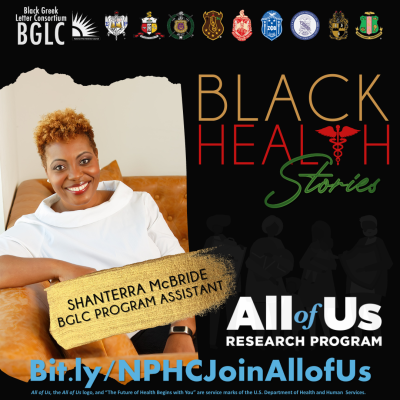Written by Shanterra McBride, BGLC Program Assistant
Have you ever known something wrong is going on in your body? If so, you’ve probably noticed that telling folks or checking the internet will have you completely misdiagnosing yourself! It’s times like this when instead of stressing yourself out even more than you already are, you need to go to the doctor.
In September 2021, I was diagnosed with relapsing-remitting multiple sclerosis. According to the National MS website, relapsing-remitting MS is defined by inflammatory attacks on myelin (the insulation protecting the central nervous system (CNS)), as well as the nerve fibers themselves. When myelin or the nerves become damaged, nerves cannot properly pass along their signals. The damaging process forms scar tissue called sclerosis, which gives the disease its name. Read that again because I know I had to. Even though the science and treatment for MS has come such a long way in the past 10 years, multiple sclerosis is incurable but it is treatable.
How did I know it was time to go to the doctor? Well, during the summer of 2021, I started having these episodes/spasms where I would feel a tingle from the left side of my head all the way down to the middle of my calf. Do you know how it feels when your arm falls asleep? Multiply that times a thousand! These spasms would last for about 75 seconds. Sometimes my speech would slur and I would stumble or feel like I couldn’t hold on to whatever was in my hands. To be clear, this was totally random. There isn’t a history of MS in my family, so I was at a loss. When I finally consulted my doctor, I did bloodwork, an MRI, a lumbar puncture, and more bloodwork, and was then given my diagnosis.
At first, my treatment plan was one pill a day. Then almost a year after my diagnosis, I had a strong feeling my MS had progressed. After my one pill of 7 mg would wear off, my left side felt like it was on fire. The tingling was back, and it was back with a vengeance! So, after another MRI my neurologist told me what I had suspected: my MS had progressed.
Y’all, I was upset! I was upset because when I was first diagnosed all I could picture was all the stuff I had left to do in my life. I immediately thought I would have to use a cane or be in a wheelchair because I didn’t know anything about MS and immediately went to the worst-case scenario. Now that it had progressed, the cane and wheelchair thoughts came back. I asked my neurologist if I should be scared, and he emphatically said, NO!
Here’s where the All of Us Research Program made a difference. My doctor and I had discussed three different treatments, and all include an infusion of some kind. As a participant of the All of Us Research Program, I knew the importance of asking IF Black people were included in the research of these drugs and more specifically, how many Black women? To ask these questions would never have crossed my mind, but since becoming a part of All of Us Research Program, I was given the knowledge and language to ask different questions and do my own research.
After my appointment, I went to the National MS website and was able to look at the research on each drug and see what may be best for me! I learned that MS affects each person differently, so I should pay close attention to my body and be very clear when communicating with my doctor. MS is an invisible disability that sucks because you can’t really explain it to others. And when there is a relapse there isn’t anything that you can do.
Part of my treatment is movement (some folks like to call it exercise), but when my body is telling me to rest, I rest. I also get massages that are specific to chronic pain. I used to think massages are a luxury but finding someone who provides relief from chronic pain with gentle intuitive massage therapy is a huge relief.
As I wait to pick a new treatment plan, I feel empowered to make a good decision. All of Us has changed so much for me. Y’all, knowledge is a game-changer, and I’ve learned there is so much more knowledge accessible to us than we think. Pay attention to your body, ask all the questions, do your research, and, if possible, do your part to make a difference in the health research of historically underserved communities. It can make a difference for you, your family, and generations to come.

